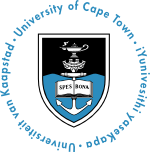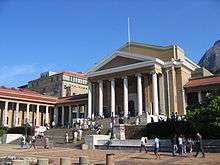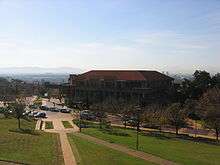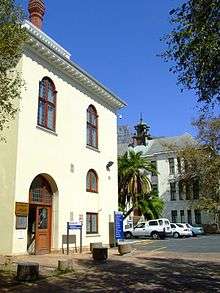University of Cape Town
|
Universiteit van Kaapstad iYunivesithi yaseKapa | |
 | |
Former names | South African College |
|---|---|
| Motto | Spes Bona |
Motto in English | Good Hope |
| Type | Public |
| Established | 1 October 1829 |
| Endowment | R2,173.4 million[1] (US$300 million as of 2010) |
| Chancellor | Graça Machel |
| Vice-Chancellor | Dr Max Price |
Academic staff | 1,980 |
Administrative staff | 2,520 |
| Students | 26,116 |
| Undergraduates | 15,800 |
| Postgraduates | 6,700 |
| Location |
Cape Town, Western Cape, South Africa 33°57′27″S 18°27′38″E / 33.95750°S 18.46056°ECoordinates: 33°57′27″S 18°27′38″E / 33.95750°S 18.46056°E |
| Campus | 4 suburban and 2 urban campuses |
| Colours | Light Blue, Dark Blue, Black and White |
| Nickname | Ikeys |
| Mascot | Tiger |
| Affiliations | AAU, ACU, CHEC, HESA, IAU, WUN |
| Website | www.uct.ac.za |
|
| |
The University of Cape Town (UCT) is a public research university located in Cape Town in the Western Cape province of South Africa. UCT was founded in 1829 as the South African College, and is the oldest university in South Africa and the oldest extant university in Sub-Saharan Africa. UCT is the highest-ranked African university in the QS World University Rankings, the Times Higher Education World University Rankings, and the Academic Ranking of World Universities, and its Law and Commerce Faculties are consistently placed among the hundred best internationally. The language of instruction is English.
History
The roots of UCT lie in the establishment of the South African College in 1829 as a school for boys. In 1874 the South African College Schools, teaching up to secondary level, were separated from the College, which prepared students for the examinations of the University of the Cape of Good Hope. In 1887 the first male residence in Southern Africa was established, known as College House Residence, under the initiative of Professor C.E. Lewis. In 1918 the South African College was elevated to full university status with the power to award degrees, and renamed the University of Cape Town.
UCT moved to the Groote Schuur Estate campus in 1928. During the apartheid era, roughly 1960-1990, many UCT students consistently opposed apartheid, and the university was a bastion of liberalism. However, the demographics of the university did not begin to change meaningfully until the 1980s and especially the 1990s. 1987 saw frequent clashes between protesting students and police, with reporting of police presence on the campus being censored by the government. On 24 April 1987 the police entered the campus and this marked the first time since 1972 that South Africa's police services had suppressed a demonstration at a white university.[2]
The UCT crest was designed in 1859 by Charles Davidson Bell, Surveyor-General of the Cape Colony at the time. Bell was an accomplished artist who also designed medals and the triangular Cape stamp.
Campus

The main teaching campus, known as Upper Campus, is located on the Rhodes Estate on the slopes of Devil's Peak. This campus contains, in a relatively compact site, the faculties of Science, Engineering, Commerce, and Humanities (except for the arts departments), as well as Smuts Hall and Fuller Hall residences. Upper Campus is centered on Jameson Hall, the location for graduation and other ceremonial events, as well as many examinations. The original buildings and layout of Upper Campus were designed by JM Solomon and built between 1928 and 1930. Since that time, many more buildings have been added as the university has grown. Upper Campus is also home to the main library, The Chancellor Oppenheimer library which holds the majority of the University's 1.3 million volume collection.
Contiguous with Upper Campus, but separated from it by university sports fields and the M3 expressway, are the Middle and Lower Campuses. These campuses, which are spread through the suburbs of Rondebosch, Rosebank and Mowbray, contain the Law faculty, the South African College of Music, the School of Economics, most of the student residences, most of the university administrative offices, and various sporting facilities. The state of the art artificial grass soccer field has been approved by FIFA for training for World Cup teams.[3] The Upper, Middle and Lower Campuses together are often referred to as the "main campus".

The Faculty of Health Sciences is located on the Medical School campus next to the Groote Schuur Hospital in Observatory. The Fine Arts and Drama departments are located on the Hiddingh Campus in central Cape Town. The University's original building, now known as the Egyptian Building, on the Hiddingh campus, was built in the Egyptian Revival style. The only other campus built in this style was the Medical College of Virginia in Richmond, Virginia in the United States. The UCT Graduate School of Business is located on the Breakwater Lodge Campus at the Victoria & Alfred Waterfront.
For his contribution of the tract of land which the campus was founded on, a bronze statue of Cecil Rhodes was erected in 1934 on the Upper Campus, overlooking the university's rugby fields. The statue was removed in April 2015 following pressure from student groups due to its perceived representation of South Africa's racist past and the university's inadequate representation of blacks. The campaign was originally triggered when activist Chumani Maxwele smeared excrement on the statue, triggering acts vandalism on the statue and other similar statues of historical white figures in the form of paint attacks and graffiti.[4] While the statue has been removed for "safekeeping", some calls have also been made by students to destroy the statue.[5]
Residential halls
- Smuts Hall is located on the upper campus, and provides housing for around 240 students. On 10 November 1950, the name "Smuts Hall" was formally adopted, named after Field Marshal The Rt. Hon. Jan Smuts. The hall was constructed as part of the first phase of the University of Cape Town's Groote Schuur Campus. The other buildings included Jameson Hall, the Arts Block, the Mathematics Building and the women's residence Fuller Hall. The group of buildings have been declared national monuments. The residents of Smuts Hall have come to be known as the "Smutsmen".[6]
Organisation
The University of Cape Town was originally incorporated as a public university by a private act of Parliament in 1918. At present it is incorporated and structured by an institutional statute issued under the provisions of the Higher Education Act, 1997.
The titular head of the University is the Chancellor; this is a ceremonial position without executive power. The primary role of the Chancellor is to confer degrees on behalf of the University, and to represent the University to the rest of the world. The current Chancellor is Ms Graça Machel, elected for her first 10-year term in September 1999 and re-elected in May 2010.

The executive head of the University is the Vice-Chancellor (or VC). The VC has the overall responsibility for the policy and administration of the University. The current VC is Dr Max Price, who replaced Professor Njabulo Ndebele on 1 July 2008. The VC is assisted in his task by a number of Deputy Vice-Chancellors (DVCs) who handle specific portfolios. The Registrar is responsible for the academic administration of the University, as well as legal matters, and is secretary to the University Council and Senate.
The academic departments of UCT are divided into six faculties: Commerce, Engineering and the Built Environment, Health Sciences, Humanities, Law, and Science; each faculty is led by a Dean. The multidisciplinary Center for Higher Education Development rates on a level equal to the faculties. Although the Graduate School of Business is considered to be part of the Faculty of Commerce, it is run independently and has its own Dean and Director.
Students and staff
As of 2013, 26,116 students were enrolled. The ratio between male and female students is almost exactly 50:50. The student body makeup comprises 32.29% "SA White" students, 43.98% non-white students (SA Black, SA Coloured & SA Indian), and the remaining 23.73% identify as "international" and "other". International students account for 18.02% of total student enrollment at 4708, representing over 100 countries.
Student Enrollment Student enrollment by population group 2009 - 2013, showing percentage growth on base[7][8]
| 2009 | 2010 | 2011 | 2012 | 2013 | % Growth | % Of Total | % Provincial Demographic | |
|---|---|---|---|---|---|---|---|---|
| SA Black | 5068 | 5323 | 5744 | 6012 | 6199 | 22.3% | 23.7% | 33.4% |
| SA coloured | 3623 | 3653 | 3687 | 3530 | 3573 | -1.4% | 13.6% | 49.6% |
| SA Indian | 1630 | 1681 | 1671 | 1701 | 1714 | 5.2% | 6.5% | 1.1% |
| SA white | 8984 | 9183 | 8992 | 8814 | 8434 | -6.1% | 32.2% | 16% |
| International | 3821 | 4171 | 4268 | 4802 | 4708 | 23.2% | 18.0% | not applicable |
| Other | 886 | 1003 | 1146 | 1191 | 1488 | 67.9% | 5.6% | not applicable |
| Total | 24012 | 25014 | 25508 | 26505 | 26116 | 8.8% | 100% | 100% |
UCT employs over 5000 staff members of whom 44% are academic staff; the rest are administrative and support staff. In 2007 UCT had 866 permanent academic staff members. Between 85% and 90% of academic staff hold doctoral or masters qualifications.
The UCT Employment Equity Plan April (2010 to March 2015) indicates moderate but consistent changes in the demographic makeup of the staff body. The five-year plan specifies specific targets ranging from between about 5% to 10% adjustments in the representation of SA Black staff. According to the plan the staff makeup would have changed by 2015 by achieving either parity or more SA Black staff than SA white in all categories other than senior lecturer and professor positions.[9]
Student life
UCT has 36 different sports clubs, including team sports, individual sports, extreme sports and martial arts.[10] The university's sports teams, and in particular the rugby union team, are known as the "Ikey Tigers" or the "Ikeys". The "Ikey" nickname originated in the 1910s as an anti-semitic epithet applied to UCT students by the students of Stellenbosch University, because of the supposed large number of Jewish students at UCT.[11] Stellenbosch is UCT's traditional rugby opponent; an annual "Intervarsity" match is played between the two universities. UCT has a total exceeding 9000 recognised sports participants.[12]

There are more than 80 student societies at UCT; these fall generally into five categories:[13]
- Academic societies for those interested in a particular field of study or studying a particular topic: The most prominent of these include the History and Current Affairs Society (HCA), United Nations Association of South Africa (UNASA) and Students for Law and Social Justice (SLSJ).
- Political societies, including branches of the youth wings of national political parties such as the South African Students Congress (SASCO), the Democratic Alliance Students Organisation (DASO), and the African National Congress Youth League.
- Religious societies, some of which are associated with religious denominations or local places of worship.
- National/cultural societies for students from particular countries or particular ethnic backgrounds.
- Special interest societies (such as RainbowUCT, the university's LGBTI society, UCT Mountain & Ski Club, UCT Ballroom and Latin dancing) for those interested in various activities or issues.
In addition to the plethora of student societies, there are several student organisations dedicated to the development of communities surrounding the University in the Cape Metropolitan Area. Some of the biggest include: SHAWCO, Ubunye and RAG.[14] Recently, several students movements have developed, such as the Green Campus Initiative.
Rankings
| University rankings | |
|---|---|
| Global | |
| Times[15] | 113 |
| QS[16] | 191 |
| Africa | |
| Times[17] | 1 |
The University of Cape Town is the highest-ranked African university in the QS World University Rankings, the Times Higher Education World University Rankings, and the Academic Ranking of World Universities. It achieved a rank of 156 in the 2011 QS World University Rankings[18] and a rank of 113 in the 2013 Times Higher Education World University Rankings,[19] making it the only African university in the top 200. Within this same ranking UCT was placed in the top 50 in the categories of life sciences and social sciences.[20][21] UCT's MBA programme was globally ranked at 54 in 2012 by the Financial Times, and was ranked first in the "value for money" category.[22] In addition to this, The University of Cape Town was placed as the second best business school in Africa and the Middle East in the 2010 QS Global 200 Business Schools Report.[23] The University also achieved a rank of 141–145 in the Russian-based Global Universities Ranking.[24] In the QS World University Rankings by subject for 2013, UCT was ranked at 32 in the subject area of education and training and ranked in the top 100 for earth and marine sciences, politics, psychology, law and legal studies, history and archaeology, geography and English language and literature.[25][26]
In 2014 UCT was ranked 4th fourth overall university among universities in the BRICS and emerging market economies and the top university in South Africa in The Times Higher Education Brics and Emerging Economies Rankings 2015.[27] In the 2015 Times Higher Education World University Rankings, the university placed 124th overall.[28]
Affiliations
UCT is a member of the Worldwide Universities Network (WUN), the Association of African Universities, the Association of Commonwealth Universities, the Cape Higher Education Consortium, Higher Education South Africa, the International Alliance of Research Universities (IARU), the African Research Universities Alliance (ARUA) and the International Association of Universities.
Notable alumni
Five of the University's graduates have become Nobel Laureates:
- Ralph Bunche, American political scientist and diplomat awarded the Nobel Peace Prize in 1950 for his role in the 1949 Armistice Agreements.
- Max Theiler, virologist awarded the Nobel Prize in Physiology or Medicine in 1951 for developing a vaccine against yellow fever.
- Professor Allan McLeod Cormack, physicist awarded the Nobel Prize in Medicine (1979) for his work on X-ray computed tomography
- Sir Aaron Klug, chemistand biophysicist awarded the Nobel Prize in Chemistry (1982) for his development of crystallographic electron microscopy and his structural elucidation of biologically important nucleic acid-protein complexes
- Professor Emeritus J. M. Coetzee (Literature, 2003)
Notable staff (past and present)
Notable research
- The Department of Mathematics and Applied Mathematics is an international centre for research in the fields of cosmology and topology.
- The Centre for Rhetoric Studies, the only one of its kind on the African Continent (director: Philippe-Joseph Salazar).
- The Department of Physics is home to the UCT-CERN research centre, which is partially responsible for the software design of the High Level Trigger component of the ALICE experiment at the Large Hadron Collider, as well as other activities related to ALICE.
- The Department of Electrical Engineering is involved in the development of technology for the Karoo Array Telescope (KAT). KAT is a precursor to the Square Kilometer Array, a proposed International project to build the world's largest radio telescope by 2020. Research groups in RF design and digital design contribute to the RF front-end and digital back-end of the KAT project.
- The Institute of Infectious Disease and Molecular Medicine (IIDMM)[29] is engaged in research on candidate tuberculosis vaccines, and is developing candidate HIV vaccines matched to the South African epidemic.
- The MRC/UCT Medical Imaging Research Unit (MIRU),[30] inspired by the work of alumnus Allan McLeod Cormack who won a Nobel Prize for the CAT-scanner, studies brain and cardiac function and develops diagnostic imaging tools, one of which has led to the spinout of CapeRay.
- The OpenUCT Initiative[31] is funded by the Andrew W. Mellon Foundation and works to make UCT's research, teaching and learning materials openly available online. Major research projects include the African Climate Development Initiative (ACDI) pilot curation project, Digital Scholarship in Emerging Knowledge Domains and Open Data in the Governance of South African Higher Education and Scholarly Communication in Africa (SCAP)
- The Department of Archaeology has found some of the oldest evidence of art and abstract thought in the world. Specifically, engrained ostrich eggshell water containers dated to 60,000 years ago[32]
See also
- Centre for Curating the Archive
- List of universities in South Africa
- Education in South Africa
- Chancellor of the University of Cape Town
References
- ↑ Annual Report for the year ended 31 December 2009 (PDF). University of Cape Town. p. 33. Retrieved 17 September 2010.
- ↑ Cape Times, staff reporter, front page, Saturday, 25 April 1987. "Large parts of the University of Cape Town campus were at times uninhabitable yesterday afternoon and some lectures were disrupted as a result of actions by certain people which may not be reported in terms of state-of-emergency press censorship. South African Breweries suffered a R120 000 loss when a cab of one of their vehicles was burnt on Upper Campus in the wake of a students’ protest march over the deaths of six railway workers and the dismissal of 16 000 others. The government’s Interdepartmental Press Liaison Centre, last night refused the Cape Times permission to publish the full facts concerning the day’s events at UCT. They also refused the newspaper permission to publish three photographs taken during the afternoon, including one of the burnt out vehicle. A four-hour confrontation between the people who may not be identified and about 150 – 200 students followed a lunch time meeting attended by about 700 students, called to protest at the deaths and firing of SA Railway’s and Harbour’s Workers Union (SARHWU) on Wednesday."
- ↑ "University of Cape Town / Newsroom & publications / Daily news". Uct.ac.za. 25 June 2009. Retrieved 20 November 2013.
- ↑ "Rhodes statue removed in Cape Town as crowd celebrates". BBC News. 9 April 2015. Retrieved 10 April 2015.
- ↑ "Why South Africa should keep Rhodes statue". BBC News. 9 April 2015. Retrieved 10 April 2015.
- ↑ "Smuts Hall Est. 1928". University of Cape Town. Retrieved 5 May 2016.
- ↑ "Introducing UCT: Statistics". About the University. University of Cape Town. Retrieved 20 March 2015.
- ↑ "Census 2011 Western Cape Municipal Report" (PDF). About the Western Cape. Statistics South Africa. Retrieved 20 March 2015.
- ↑ "Transformation Plan & Policies: UCT Employment Equity Plan (2010 - 2015)". About the University. University of Cape Town. Retrieved 20 March 2015.
- ↑ "Current Sports Clubs". Sportsclubs.uct.ac.za. Retrieved 8 June 2007.
- ↑ Swanson, Felicity (2007). "'Die SACS kom terug': intervarsity rugby, masculinity and white identity at the University of Cape Town, 1960s-1970s" (PDF). In Field, Sean; et al. Imagining the City: Memories and Cultures in Cape Town (PDF). Cape Town: HSRC Press. p. 210. ISBN 0-7969-2179-2. Retrieved 8 June 2007.
- ↑ "University of Cape Town / Current students / Sports, societies & recreation". Uct.ac.za. Retrieved 20 November 2013.
- ↑ "Student Affairs: Societies". University of Cape Town. Archived from the original on 3 June 2007. Retrieved 8 June 2007.
- ↑ "Student Community Service: SHAWCO". University of Cape Town. Retrieved 1 March 2010.
- ↑ "World University Rankings 2016-2017". Times Higher Education. 2015. Retrieved October 22, 2016.
- ↑ "QS World University Rankings 2016/17". Quacquarelli Symonds Limited. 2016. Retrieved September 8, 2016.
- ↑ "Best universities in Africa 2016". The Times Higher Education. 2016. Retrieved September 8, 2016.
- ↑ "QS World University Rankings - 2011". Top Universities. 19 December 2012. Retrieved 20 November 2013.
- ↑ "Times Higher Education World University Rankings 2012–2013". Retrieved 24 July 2013.
- ↑ "All Study Destinations". Top Universities. Retrieved 20 November 2013.
- ↑ "University Rankings". Top Universities. Retrieved 20 November 2013.
- ↑ "Business school rankings from the Financial Times - University of Cape Town GSB". Rankings.ft.com. Retrieved 20 November 2013.
- ↑ Archived 17 October 2010 at the Wayback Machine.
- ↑ "Global Universities Ranking 2009". Globaluniversitiesranking.org. Retrieved 20 November 2013.
- ↑ "QS World University Rankings by Subject 2013 - Education". Top Universities. 30 April 2013. Retrieved 20 November 2013.
- ↑ Sipho Masombuka. "UCT right up there with the world's best". Times LIVE. Retrieved 20 November 2013.
- ↑ "UCT leads SA pack in university rankings". Cape Argus. 4 December 2014. Retrieved 8 December 2014.
- ↑ "World University Rankings 2014-15". The Times Higher Education. Retrieved 10 September 2015.
- ↑ "IDM Institute of Infectious Disease and Molecular Medicine - welcome". Uct.ac.za. Retrieved 20 November 2013.
- ↑ "BME – Biomedical Engineering - MRC/UCT Medical Imaging Research Unit". Miru.uct.ac.za. 11 May 2000. Retrieved 20 November 2013.
- ↑ "OpenUCT Home Page". Openuct.uct.ac.za. Retrieved 20 November 2013.
- ↑ http://www.pnas.org/content/107/14/6180.full
External links
- Official website
- Statute of the University of Cape Town, Government Notice No. 1199, 20 September 2002.
- Southern African University
- UCT OpenContent - Open Educational Resource website
| Wikimedia Commons has media related to University of Cape Town. |
